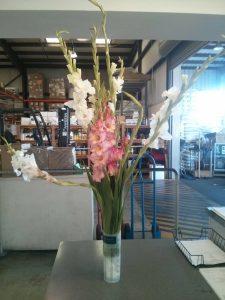Unnatural Wine: An Origin Story
In 2015, I left my PhD program in London and ended up moving back home with my parents in Napa. I’d half expected to end up working in a tasting room; but it was the off season, so instead I spent 6 months selling soil amendments and fungicides to wine growers from the front counter of an ag supply warehouse.
I really had no interest in wine or vineyards at that point. But I talked to the vineyard guys. I started talking lunch walks along a vineyard road and saw, day by day, how the vines progressed through all the milestones- bud break and fruit set and verasion. The rhythms and ruptures of the growing season wove their way through my life like a vine, subtle and sprawling.
It was a bad year for powdery mildew, and one of my jobs every morning was checking the daily mildew index. It was this way that I learned the subtle shifts in weather that presaged ruin in the vineyard and – more relevant to my own daily routine- high levels of drama in the office as there were sudden rushes for fungicides, leading to yelling matches between the sales guys and the occasional meltdown by customers who’d show up to pick up their orders only to find a sales guy had absconded with them to fulfill last minute orders by bigger clients.
It was also the first place I heard about “Los(t) Carneros,” and the ravages of the vine mealybug and European grapevine moth. Over donuts, growers grumbled over foreign conglomerates who concealed outbreaks of invasive pests rather than report them, the consecutive warm winters which had enabled their spread. I heard about the fights against them, and powdery mildew, and all the other things that keep growers up at night. And I learned, piecemeal, that there’s no such thing as natural agriculture. Agriculture is artifice- it requires intense effort, skill, and care. There’s no such thing as farming at any kind of scale without spray programs and other interventions (yes, even organic. Even biodynamic, which is not “organic+” but a weird pseudoscience based on astrology and homeopathy… but one that, crucially, requires that its practitioners pay exacting attention to their land).
A vineyard without sprays is a lost vineyard (and a vector for diseases for other vineyards).*
And it impressed upon me the degree to which what matters in the vineyard is care. The biggest differentiator between growers wasn’t ideological commitments to one farming program over another. It was their conscientiousness. It was how invested they were in maintaining the health of their land and their vines over the long term.** The best growers maintained an interest verging on obsession with the minutiae of their vines and land, and that care and attention drove all their choices in the field.
And, in a weird way, this was what got me interested in wine. Despite growing up in wine country, the art and craftsmanship of wine growing had never occurred to me. It’s just plants, doing what plants do, right?
But it’s not. It’s craftsmanship, and love, and intention and attention. At it’s best, it’s collaboration, rather than extraction.
And it’s the same thing in the cellar. It’s the “love per gallon,” as Bryan Avila calls it. If you really, truly love the wine and the grapes, you pay attention to it. You’re interested in the collaboration, in the interplay of terroir and people and weather and bacteria and yeast. That’s a gift not afforded to those making a mass product that needs to be the same every year.
The differentiator of winemakers is attention, intention, and care. You’re making choices about what will best accent your favorite parts of the fruit. The fruit sets the beat and the melody, and you’re taking it and putting your own spin on it and sending it back.
And this is one of the many reasons I’ve never really been comfortable with the term “natural wine,” even as I’ve met some awesome winemakers doing fantastic things under that label.
It’s selling people an idea that’s not only misleading (I’ve talked to enough of the average consumer to know that they think natural and organic means “no human intervention”), it also removes the most remarkable aspect of great farming and great winemaking: the effort and intention and care of the human beings behind it.
Care is what is missing in mass conventional farming and commoditized winemaking. How can we talk about what’s different about small indie winemaking (and winegrowing) if we erase the human aspects?

* “Organic” involves avoiding nitrate fertilizers, a focus on soil health, and avoiding certain classes of pesticides (but still allows quite a lot of highly toxic pesticides, the kind where you better be wearing your PPE if you’re applying it.) I sold as much PPE to organic growers as I did conventional growers, along with many of the same identical chemicals.
** The organic growers who were contemplating abandoning their organic certifications in the fight against the VMB were considering the long term good of their land and their neighbors over what was most profitable for them in the short term. But it’s an excellent illustration of the way their priority was the land first, which is why they’d become organic farmers in the first place.

